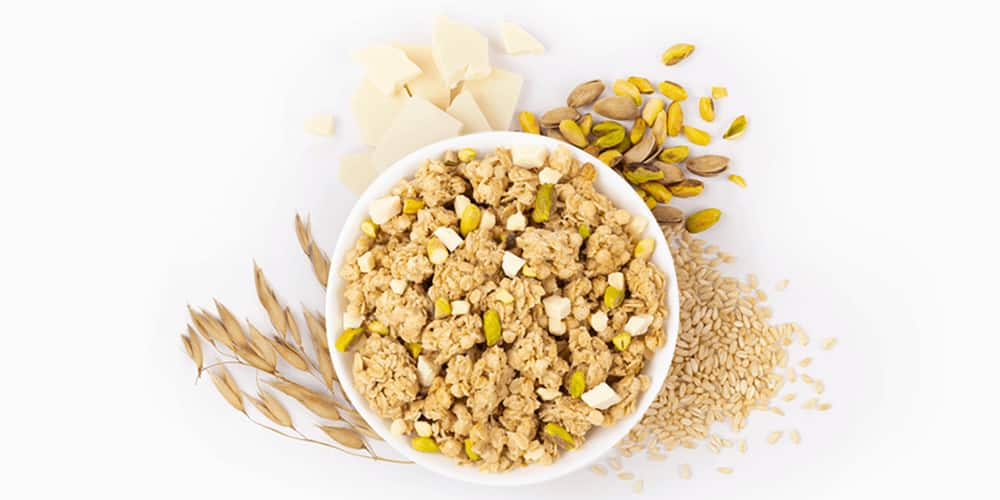
Best Start to the Day
Breakfast literally means “Breaking the Fast”. For some people, especially younger children, the overnight fast can last as long as 16 hours.
1. Breakfast helps support brain function
Thus the regular consumption of a healthy breakfast is important for both enhanced cognitive performance as well as better academic achievement.
2. Breakfast can improve nutrient intakes
3. Breakfast-eaters tend to have healthier body weights
4. Breakfast improves metabolism
Breakfast intake improves several parameters associated with obesity, cardiovascular disease, Diabetes and promotes overall metabolic health. Regular breakfast consumption has many benefits:
5. Breakfast consumption promotes physical and mental well-being
Hence, taking as little as five minutes to relax and prepare for the day with a bowl of cereal, milk and fruit really ensures a positive start.
1 Ptomey etal L.T. (2016) Breakfast Intake and Composition is Associated with Superior Academic Achievement in Elementary School Children. J Am Coll Nutr. May-Jun;34(4):326-333.
2 Adolphus K.etal (2016) The Effects of Breakfast and Breakfast Composition on Cognition in Children and Adolescents: A Systematic Review. Adv Nutr. May;7(3):590S-612S.
3 Adole A.A. & Ware M.B. (2014) Assessment of breakfast eating habits and its association with cognitive performance of early adolescents (11-13 years) in Shebedino District, Sidama Zone, Southern Ethiopia. Journal of Food and Nutrition Sciences 2(4):130-137.
4 Galioto R. & Spitznagel M.B. (2016) The Effects of Breakfast and Breakfast Composition on Cognition in Adults. Adv Nutr. May;7(3):576S-589S
5 Liu J. etal (2013) Regular breakfast consumption is associated with increased IQ in kindergarten children. Early Hum Dev 89(4) 257-262.
6 Littlecot H.J. etal (2016) Association between breakfast consumption and educational outcomes in 9-11-year-old children. Public Health Nutr. Jun; 19(9):1575-1582.
7 Williams P.G. (2014) The Benefits of Breakfast Cereal Consumption: A Systematic Review of the Evidence Base. Adv Nutr. Sep;5(5): 636S-673S.
8 Barr S.I. etal (2014) Breakfast consumption is positively associated with nutrient adequacy in Canadian children and adolescents. Br J Nutr. 2014 Oct28;112(8): 1373-1383.
9 Moore F.F. etal (2016) Impact of Breakfast Skipping and Breakfast Choice on the Nutrient Intake and Body Mass Index of Australian Children. Nutrients. Aug;8 (8):487.
10 O’Neal C.E. etal (2014) Nutrient intake, diet quality, and weight/adiposity parameters in breakfast patterns compared with no breakfast in adults: National Health and Nutrition Examination Survey 2001-2008. J Acad Nutr Diet. Dec;114(12 Suppl):S27-43
17 Tee E.S. etal (2018) Breakfast consumption among Malaysian primary and secondary school children and relationship with body weight status – Findings from the MyBreakfastStudy. Asia Pac K Clin Nutr. 27(2):421-432.
18 Blondin SA (2016) Breakfast consumption and adiposity among children and adolescents: an updated review of the literature. Pediatr Obes. Oct;11(5):333-48.
19 Sakurai M (2017) Skipping breakfast and 5-year changes in body mass index and waist circumference in Japanese men and women. Obes Sci Pract. Jun;3(2):162-170.
11 Odegaard etal A.O. (2013) Breakfast Frequency and Development of Metabolic Risk. Diabetes Care. Oct; 36(10):3100-3106.
12 Uemura M. etal (2015) Breakfast Skipping is Positively Associated with Incidence of Type 2 Diabetes Mellitus: Evidence from the Aichi Workers’ Cohort Study. J Epidemiol. 25(5):351-358.
13 Shafiee G.et al (2013) Association of breakfast intake with cardiometabolic risk factors. Jornal de Pediatria, Volume 89, Issue 6, November-December Pages 575-582
14 Kubota Y.etal (2016) Association of Breakfast Intake with Incident Stroke and Coronary Heart Disease- The Japan Public Health Center-Based Study. Stroke, 47:477-481.
15 Maki K. C. etal (2016) The Effects of Breakfast Consumption and Composition on Metabolic Wellness with a Focus on Carbohydrate Metabolism. Adv Nutr. May; 7(3):613S-621S
20 Deshmukh-Tasker: et al. The relationship of breakfast skipping and type of breakfast consumed with overweight/obesity, abdominal obesity, other cardiometabolic risk factors and the metabolic syndrome in young adults. The national Health and Nutrition Examination Survey (NHANES): 1999-2006. Public Health Nutr. 2013;16(11):2073-82.
21 Hallstrom, L et al. Breakfast consumption and CVD risk factors in European adolescents: The HELENA (Healthy Lifestyle in Europe by Nutrition in Adolescence) Study. Public Health Nutrition, ISSN1368-9800, E-ISSN 1475-2727, Vol. 16, no7, p.1296-1305.
22 Williams PG. The Benefits of Breakfast Cereal Consumption: A Systematic Review of the Evidence Base. Adv. Nutri. 2014;5:6365-6735.
16 Wang M. etal (2016) Breakfast Consumption and Its Associations with Health-Related Behaviors among School-Aged Adolescents: A Cross-Sectional Study in Zhejiang Province, China. Int J Environ Res Public Health. Aug;13(8):761.
23 Larson N, et al. Eating breakfast and dinner together as a family: associations with sociodemographic and implications for diet quality and weight status. J Acad Nutr Diet. 2013;113(12):1601-9.
Helping consumers make informed food choices

Breakfast literally means “Breaking the Fast”. For some people, especially younger children, the overnight fast can last as long as 16 hours.

Incorporation of breakfast cereals as part of a balanced breakfast provides a great opportunity to include important benefits of grains in the diet.

In both developed and developing countries, cardiovascular diseases (CVD) and cancer are major causes of mortality.
Mars Completes Acquisition of Kellanova. Read More